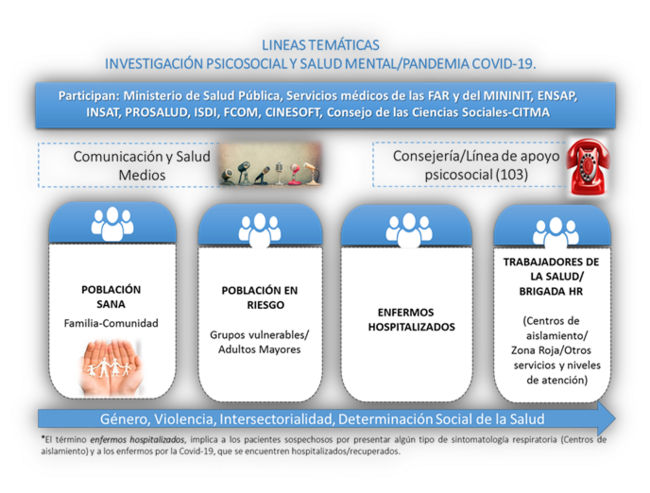Cuban guarantees comprehensive and integrated health care to the population and has prioritized addressing the health emergency caused by COVID-19 through the Ministry of Public Health (MINSAP), by implementing a Government National Plan with effective measures to minimize risks and vulnerabilities and increasing the role of different social actors.
In this regard, an interdisciplinary and intersectoral Working Group was formed, made up of experts in mental health and in emergency and disaster situations from the Ministry of Public Health, as well as other actors from different educational and health institutions in the country, with the objective of designing a life-course and gender-based program, focusing on the social determinants of health, to prevent and manage the psychosocial risks of the population and health workers in the context of the COVID-19 pandemic emergency.
The national Action Protocol 1.6, which includes mental health care, was designed, implemented and systematically updated according to the stages and evolution of the pandemic. In this regard, the services’ network was reorganized and expanded with a telephone counselling service: "Psychosocial and mental health support line" (103), which operates 24 hours a day, free of charge and with national coverage.
Guaranteeing specialized care from municipal mental health departments, avoiding stigma and protecting people's rights are part of the pillars designed to offer comprehensive and quality care. Additionally, WhatsApp groups and telecare are also available.
Protecting and caring for children, not only from the damage to their health caused by COVID-19, but also from the emotional effects that the pandemic can have on them, is also a constant challenge.
Multidisciplinary teams in each of the provinces developed research and interventions, primarily based on activities with specific vulnerable groups and convalescents of COVID-19.
Cuba´s training institutions (Ministry of Education and Higher Education), together with the Centre for Research in Neurosciences and the Centre for Demographic Studies, developed a series of tools with different types of support material (self-teaching materials, infographics, spots, among others) to assist educators in dealing with the new confinement conditions. A New Normal Life Code was designed to reinforce compliance with individual and collective epidemiological measures as basic pillars during all stages of the pandemic. Self-care and self-responsibility are reinforced in the messages offered by specialized personnel in the media, prioritizing those dedicated to children, their families and educators.
At the heart of these actions is the training of health workers and different social actors to ensure their good performance. With the participation of university students, led by medical science students, a work system that systematically reaches every household was established to identify any physical or emotional discomfort and intervene in a timely manner.
PAHO/WHO has been providing technical support and continuous exchange of information and experiences between countries in the Region.

